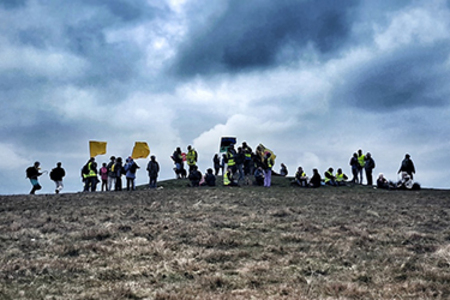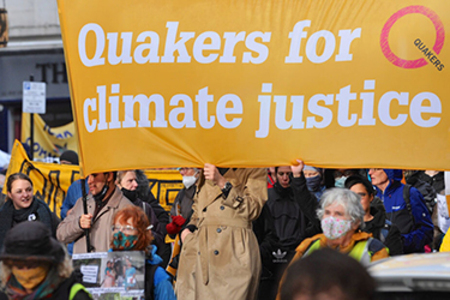People who have benefited the least from the fossil fuel era are now suffering the most from the impacts of climate breakdown. They are overwhelmingly poor, women and people of colour. Many have also been marginalised through economic exploitation and racism throughout history. Working against this inequality is climate justice.
- Find out about our current climate justice campaigns.
- See the Climate justice: a Quaker view leaflet (PDF).
Climate justice
The wealth of the UK and other industrialised countries is built on the violent and racist exploitation of people and the earth. We face interconnected challenges: extreme inequality and environmental destruction.
Quakers are working to persuade economic and political decision makers to take ambitious climate action and put justice at the heart of their decision making. This means redirecting money away from fossil fuel extraction and towards solutions for people and planet, including supporting those currently affected by climate breakdown.
In 2011, the annual gathering of British Quakers noted that 'the global economic system is posited on continued expansion and growth, and in its pursuit of growth it is often unjust, violent and destructive.' This gathering reaffirmed our commitment to act as a faith community and recognised that tackling inequality is central to taking action on the climate emergency. It called on Quakers to act in new ways – individually, as local communities, as a corporate body of faith, and politically. Find out more about the spiritual basis for Quaker climate action.
Quaker action on climate justice
We have two current campaigns. Make Polluters Pay focuses on asking governments to provide funds to support those affected by climate breakdown. Insure Our Future focuses on asking insurance companies to stop providing insurance to fossil fuel projects, particularly those that risk violating human rights. You can find out more about these campaigns here [link to A4 Current Climate Justice Campaigns]. We also work with the Climate Justice Coalition (offsite link) and Faith for the Climate network (offsite link) to campaign together for a global transition beyond fossil fuels.
We also offer resources for Quaker groups and individuals to learn more. Our Exploring Faith and Climate Justice booklets are designed to support Quakers to develop a thorough understanding what climate justice really means and what it looks like in practice. They are packed with information, links to resources, and reflection questions, and they can be followed individually or with a discussion group.
Many Quakers work to make their lives low-carbon and sustainable, and support their local communities to do the same. Woodbrooke Quaker Study Centre provide a range of educational resources that support a shift to sustainable living. Visit Woodbrooke's website for more information.
Sign up to hear from Quakers in Britain
Sign up to the Faith in Action newsletter for the latest news and opportunities to get involved with Quakers in Britain climate action.

